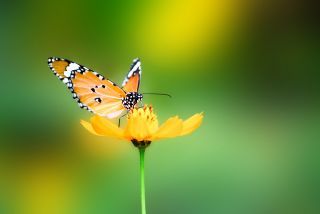When you leave old thinking behind, anything is possible.
-- by Linda Bloom
I am a recovering pessimist. I grew up in a family that had a basement freezer crammed with food and cases of canned goods stacked against the walls. All this hoarding was preparation for the economic or political disaster that my parents were certain would occur.
I grew up hearing stories about my grandfather's assault on a Russian army officer who had taunted him with anti-Semitic remarks. As the story goes, he then fled and deserted the military, leaving Russia to emigrate to the United States. There were stories about the pogroms and violence that occurred in the old country, particularly on Easter Sunday, when angry neighbors took it upon themselves to punish the "Christ killers." There was also a steady stream of stories about all of the relatives who perished in the Holocaust because they didn't leave Europe in time.
My parents' caution was well-meaning, but it left me with a sense of anxiety and a pervasive belief that doom and catastrophe are always right around the corner.
When I left for college, I thought that I had been admitted by mistake, and didn't think I would graduate. I expected failure. I expected to fall in love but also that I would probably be left by my beloved. But I had no idea that my general attitude was deeply pessimistic -- I just thought it was realistic.
By studying psychology and human development, I came to understand that we all form protective beliefs, and that these beliefs can be modified. What a concept! I put the theory to the test and was delighted to discover that it was actually possible for me to change my thinking. With concerted effort, my rich imagination -- which had been catastrophizing -- started to envision successful outcomes for the scenarios I anticipated.
So much of my happiness now is a result of my efforts to put my inner pessimist in his place. When he sneaks onto the scene and starts spinning his fearful scenarios, I know that he is just doing his job to protect me by preparing me for trouble. But these days I talk back. I say things like, That may or may not happen. Thank you for sharing, but I choose to believe that things will turn out well.
I've had losses and tragedy in my life; every life has to contain its share of joys and sorrows. I have come to trust that it is possible to make a full recovery from some ordeals, and at least a partial recovery from the even most devastating blows. To waste precious life energy worrying about what might happen is unproductive and can even become self-fulfilling. I now know that I have choices. I still have to exert effort when pessimistic thoughts arise. But with experience and practice, it has become easier to trust that things generally do work out--and not necessarily in the way in which I expect.
Some people see optimists as "Pollyannas," believing they are in denial about reality. Of course optimism can be taken too far. But those who criticize optimists are often pessimistic themselves, and believe that they are stuck with their attitudes for life. Maintaining optimism as a life view is a much more harmonious way of living. Despite some negative experiences, I see people as being basically good, the universe as a friendly place, and nature as trustworthy. So much of my energy that used to be used defensively has now been freed up for more creative pursuits.
If you think that your own beliefs and attitudes are fixed, I challenge you to reassess, and dare to believe in the possibility of transforming the darkness of pessimism into a more hopeful outlook. Working with our attitudes and beliefs is an essential part of cultivating the art of joyful living. Don't take my word for it; give it a try and see for yourself. You may be in for a pleasant surprise.
